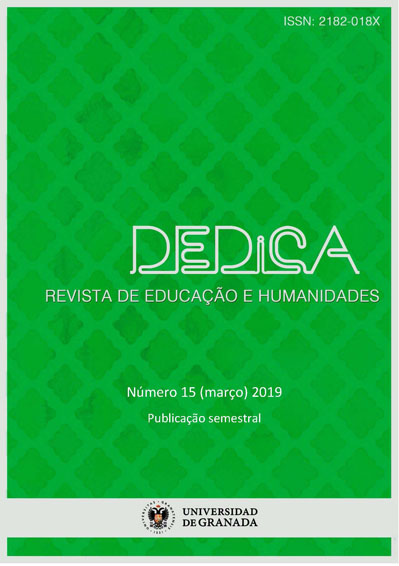Sustainable development goals and implications in Higher Education: application to an Institution of Higher Education of applied Social Sciences
DOI:
https://doi.org/10.30827/dreh.v0i15.8032Keywords:
Social responsibility, Higher Education, United Nations Global Compact, principles of responsible management education, Sustainable Development GoalsAbstract
The first decade of the twenty-first century is rich in the production of guidance documents, in particular emanating from the United Nations, for a more responsible education attuned to the challenges of the new millennium. Beyond these documents, we highlight two central ideas: a clear reinforcement and commitment with the obligation to think about new models of action that guarantee a Sustainable Development and the awareness that Higher Education is a privileged space for an action that promotes the awareness of the new priorities, to be assumed by the future leaders to guarantee this same Development.
From the reflection presented at "Challenges and Opportunities for the communication of the organizations in the Sustainable Development Goals" (Fernandes, 2018), this article is now analyzing the specific implications that these documents can have at the level of Higher Education. At the same time, the basis of a pilot study to be implemented at the School of Education of the Coimbra Polytechnic Institute (2018/19) is set out to apply new learning strategies for Sustainable Development, starting from of a reflection on the Sustainable Development Goals (of the UN and to be fulfilled between 2016/30).
The methodology used for the preparation of the pilot study, presented here, is the content analysis of the descriptive of the professional profile of the alumni of the ESEC / IPC degrees, available on the ESEC website, seeking to translate it in terms of leadership exercised by these same professionals. For the construction of the pilot study, the methodology of the online questionnaire was also used to determine which Sustainable Development Goals are most addressed to each degree, thus outlining a specific Agenda for priority areas of intervention.
Downloads
References
Annan-Diab F.; Molinari C. (2017). Interdisciplinarity: Practical approach to advancing education for sustainability and for the Sustainable Development Goals. The International Journal of Management Education 15 (2017) pp. 73 – 83. DOI: 10.1016/j.ijme.2017.03.006
CE – MEMO/11/730 (de 25 de Novembro de 2011). Corporate Social Responsibility: a new definition, a new agenda for action. Recuperado em http://europa.eu/rapid/press-release_MEMO-11-730_en.htm.
Dickson M., Eckman M., Loker S., Jirousek C., (2013) "A model for sustainability education in support of the PRME", Journal of Management Development, Vol. 32 Issue: 3, pp.309-318, https://doi.org/10.1108/02621711311318337
Fernandes, J. L. (2018). Desafios e Oportunidades para a Comunicação das Organizações nos Objetivos de Desenvolvimento Sustentável. DEDiCA. REVISTA DE E DUCAÇÃO E HUMANIDADES, 14, 103-117, 10.30827/dreh.v0i14.7505
Friedman A. & Miles S. (2006). Stakeholders. Theory and Practice. Oxford: Oxford University Press.
Giacalone, R.; Thompson K. (2006). Business Ethics and Social Responsibility Education: Shifting the worldview. Academy of Management Learning & Education, vol 5, nº 3, pp. 266-277
Jinsong Wu, Song Guo, Huawei Huang, William Liu, and Yong Xiang (2018). Information and Communications Technologies for Sustainable Development Goals: State-of-the-Art, Needs and Perspectives. IEEE (This article has been accepted for publication in a future issue of this journal, but has not been fully edited. Content may change prior to final publication), pp. 1-18.
Kearins K.; Springett D. (2003). Educating For Sustainability: Developing Critical Skills. Journal of Management Education 2003 (27), pp. 188-204. DOI: 10.1177/1052562903251411
Laszlo C., Sroufe, R., & Waddock, S. (2017). Torn between two paradigms: a struggle for the soul of Business Schools. AI Practitioner, 19 (2), 108-119. doi: 10.12781/978-1-907549-31-1-12
ONU (2015). Transforming our world: the 2030 Agenda for Sustainable Development. Resolução adotada na Assembleia Geral de 25 de Setembro de 2015.
PRME (2018). Our 2030 Vision. Acedido em http://www.unprme.org/about-prme/index.php
Storey ,M., Killian S. & O'Regan P. (2017). Responsible management education: Mapping the field in the context of the SDGs. The International Journal of Management Education 15, pp 93-103. http://dx.doi.org/10.1016/j.ijme.2017.02.009
Setó-Pamies D.; Papaoikonomou E. (2016). Multi-level Perspective for the Integration of Ethics, Corporate Social Responsibility and Sustainability (ECSRS) in Management Education. Journal of Business Ethics 136, 523-538. DOI 10.1007/s10551-014-2535-7
UNGC (s/data). Portal do United Nations Global Compact (em port. Pacto Global das Nações Unidas). Recuperado de https://www.unglobalcompact.org/what-is-gc/mission/principles
Vallaeys F., de la Cruz C. & Sasia, P. (2009). Responsabilidad Social Universitaria: Manual de primeiros pasos. Mexico: McGraw-Hill Interamericana.
Weybrecht G. (2017). From challenge to opportunity - Management education's crucial role in sustainability and the Sustainable Development Goals - An overview and framework. The International Journal of Management Education 15, pp 84-92. DOI: 10.1016/j.ijme.2017.02.008.
Zizka L. (2017) Student perceptions of ethics, CSR, and sustainability (ECSRS) in hospitality management education, Journal of Teaching in Travel & Tourism, 17:4, 254-268, DOI: 10.1080/15313220.2017.1399497












